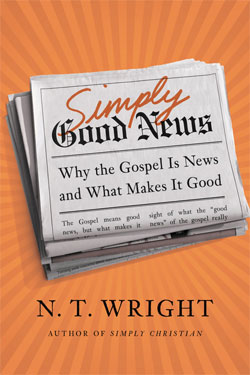N.T. Wright’s new book, released today, Simply Good News: Why the Gospel Is News and What Makes It Good (HarperOne, $24.99) sets out to reorient and refocus the Christian faith by examining its central tenet: the gospel.
What is the gospel of Christianity, the good news at the heart of Christian faith?
According to Wright (and according to the Bible, for Wright provides ample Biblical support for his positions), the good news is that
the one true God has now taken charge of the world, in and through Jesus and his death and resurrection.
Throughout the book, Wright pithily explores the context, significance and meaning of this gospel. He offers a clear distillation of the good news through a refocusing of the lens of Christian faith and practice:
I think we have lost touch with a basic element of the Christian faith. The Christian faith, in its earliest forms, is presented as good news. … I am arguing that the idea of seeing the Christian faith as news that is good is itself, ironically, news to many people today.
Many of Wright’s arguments will be familiar to those who have read his other books: his writing about the Bible, Heaven, Jesus and Christianity all cover related ground. However, the narrower focus of Simply Good News allows Wright to repeatedly and forcefully drive home his central thesis.
Again and again Wright returns to the essential point that, regardless of the philosophy and theology du jour, Christianity was, and is, above all else, about an actual event:
Christianity is, simply, good news. It is the news that something has happened as a result of which the world is a different place. … To many people then, and to many today, this was and is either nonsense or offensive or both. One can debate the merits of a religion, moral system, or philosophy, but a news event is discussed in a different way. Either the event happened or it didn’t; if it did happen, either it means what people say it means or it doesn’t.
Regrettably, in defense of the veracity the good news of Christianity, Simply Good News is often frustratingly brief. Wright’s discussions of the resurrection and the problem of evil are little more than summaries of the issues. Christianity may purport to offer good news, but why should we believe it, especially given extraordinary nature of its claim, as well as the prevalence of so much bad news in the world around us?
Wright acknowledges such difficulties, and has written elsewhere in much greater detail about these topics, but I’m doubtful that his wistful nods in the direction of more developed arguments will carry much weight with those not already on his side.
This clearly isn’t a book of apologetics: Wright isn’t writing to offer a comprehensive defense of the good news, he’s writing to those who are already inclined to believe that news, but have perhaps lost sight of its significance.
Modern forms of Christianity often give lip service to the gospel, but fall far short of the event-driven faith that Wright describes. One only wonders what the world would look like if more self-proclaimed Christians truly lived in light of the good news.
To that end, Wright closes the book with a verse-by-verse reading of the Lord’s Prayer as a practical invitation to embrace the significance of the good news of Christianity. His exegesis of Jesus’ words is thoughtful and accessible, offering concrete Biblical wisdom as to how we can live as good news people–people who embrace the belief that
the God who the early Christians believed had revealed himself in Jesus—and in the Spirit of Jesus, now at work through the good news in the world, in the hearts and minds of men, women, and children all over the place—is the one true God, who calls to them with sovereign love and summons them to join in his work of new creation. And that this was, and still is, good news.
 Dan Wilkinson
Dan Wilkinson
Dan is the Executive Editor of the Unfundamentalist blog. He is a writer, graphic designer and IT specialist. He lives in Montana, is married and lives with two cats.

Leave a Reply